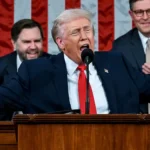
Fernando Rosso He is a journalist, he drives The Red Circle and is director of La Izquierda Diario. Furthermore, it is author of “The Impossible Hegemony“. In an extensive interview with Matías Colombatti in “Circo Freak”analyzed the current political situation, the government’s relationship with the United States, the economy and the prospects for facing adjustment policies.
Some of the definitions that Fernando Rosso left in this interview:
But also because when the general proposals were seen, no one told him: “I have this program and there is not going to be inflation.” It was like we were going back to the past, but hey, this stability in a perspective of low expectations.
I believe that the government can confuse electoral support with endorsement of any political program. And I believe that he was not voted for to carry out labor reform. Or, in any case, yes a hard core, yes a right-wing vote that always exists in Argentina, but not this support, but rather it had other causes:
One was an unprecedented rescue by the United States government that acted as a containment of the situation, of the disaster that the economic program, the financial program above all, could enter, and as extortion.
In Argentina we are coming from decades of inflation that is maddening. In the world it has been studied that inflation generates a disciplining factor; Someone even wrote that it is like military dictatorships, like Weimar in Germany and what came after.
I think it also played the specter of a return to which many people, especially in the politicized sector, thought they had forgotten Alberto Fernández; He had gone back to doing what he does best, which is tweeting.
It was believed that everyone forgot about that government, and no. That is no longer here. The life experience of four years, of a pandemic, of the “State saves you” that does not save you, etc., etc., was not forgotten.
At that time it was said that they all became Peronists or Popular Nationalists and now they all became Libertarians. I think that changes in consciousness are slower. I think that in the Milei voter there are also important, acute contradictions, in which many things of the state and the public are defended; That’s why, when it came to the university, many of its base also mobilized or became aware of the issue, the same with the Garrahan, people with disabilities, etc.
I believe that there is a withdrawal of the State in terms of letting capital do whatever it wants, let’s say, right? Vincent. I don’t want to discuss just Vicentín itself. I mean, Argentina has a private monopoly on foreign trade, foreign trade is controlled by 5 or 6 cereal companies. In one weekend, a difference of 1.5 billion dollars was made. I don’t see any State that oppresses anyone there. It is a State that lets things be done… and from there a lot of money went away that later led to the financial crisis, it had consequences in the financial crisis because there are no dollars to support it, etc. Then Trump came and put it up.
And what worries me is that the popular majorities, what do they have to oppose him to that If it is not organization, mobilization, a national mobilization? I’m not talking about a mobilization for a march, I’m saying a process of national mobilization where from the unions to the student centers to the women’s movement say: “we are going to defend our sovereignty.” I think he didn’t play; I insist, among the sector that went to vote, a third did not go to vote. In other words, there is a sector that did not go to vote and many people who voted against him.
That was influenced by that semi-anti-American feeling that is more important among Argentines than in all of Latin America.
Now, if you don’t turn that feeling into action… Donald Trump is not going to be stopped with a good election campaign. Or only from the National Congress; I am not saying that it is not valid from the National Congress.
When I say asymmetric polarization, what am I saying? There is a right that says: “We go for everything.” We want the dominance of direct capital, we want a resettled country, we do not want a union, we want to be Peru.
One of the best campaigns for Milei was carried out by the United Provinces, which said: “Milei is all barbaric, except for his ideas, except for his forms. His ideas are essentially barbaric.” And people said, “Well, then you voted for Milei.” That’s why Pujaro, Nacho Torres failed… Tremendous electoral failure, shocking. Well, gringo Schiaretti, Cordobanism… Losing in their own provinces.
He made a good choice in the City of Buenos Aires, the capital of the country.
Before they said: “Jujuy is an exception…” Now the left got 10% of the votes in the center of the country. It is the extreme anti-capitalist left. With a 17-game campaign, where there was no STEP.
Watch the full interview
Source: www.laizquierdadiario.com

